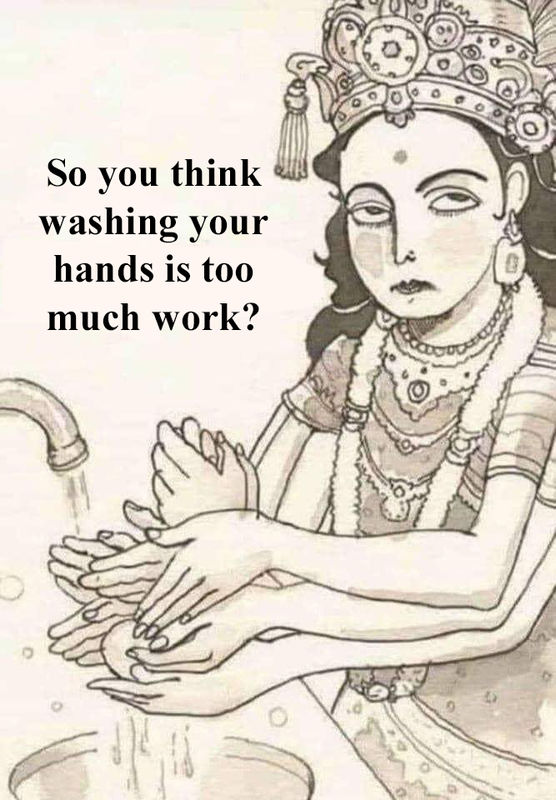History Lesson
Apr 9, 2020 16:42:35 #
Got this from my niece in Idaho.
Interesting history!
They used to use urine to tan animal skins, so families used to all pee in a pot & then once a day it was taken & sold to the tannery. If you had to do this to survive you were "piss poor."
But worse than that were the really poor folk who couldn't even afford to buy a pot; they "didn't have a pot to piss in" & were the lowest of the low.
The next time you are washing your hands & complain because the water temperature isn't just how you like it, think about how things used to be. Here are some facts about the 1500s.
Most people got married in June because they took their yearly bath in May, and they still smelled pretty good by June. Since they were starting to smell, however, brides carried a bouquet of flowers to hide the body odor. Hence the custom today of carrying a bouquet when getting married.
Baths consisted of a big tub filled with hot water. The man of the house had the privilege of the nice clean water, then all the other sons and men, then the women, and finally the children. Last of all the babies. By then the water was so dirty you could actually lose someone in it . . . hence the saying, "Don't throw the baby out with the Bath water!"
Houses had thatched roofs-thick straw-piled high, with no wood underneath. It was the only place for animals to get warm, so all the cats and other small animals (mice, bugs) lived in the roof. When it rained it became slippery and sometimes the animals would slip and fall off the roof, resulting in the idiom, "It's raining cats and dogs."
There was nothing to stop things from falling into the house. This posed a real problem in the bedroom where bugs and other droppings could mess up your nice clean bed, therefore, a bed with big posts and a sheet hung over the top afforded some protection. That's how canopy beds came into existence.
The floor was dirt. Only the wealthy had something other than dirt, leading folks to coin the phrase "dirt poor."
The wealthy had slate floors that would get slippery in the winter when wet, so they spread thresh (straw) on floor to help keep their footing. As the winter wore on, they added more thresh until, when you opened the door, it would all start slipping outside. A piece of wood was placed in the entrance-way, subsequently creating a "thresh hold."
In those old days, they cooked in the kitchen with a big kettle that always hung over the fire.. Every day they lit the fire and added things to the pot. They ate mostly vegetables and did not get much meat. They would eat the stew for dinner, leaving leftovers in the pot to get cold overnight and then start over the next day. Sometimes stew had food in it that had been there for quite a while, and thus the rhyme, "Peas porridge hot, peas porridge cold, peas porridge in the pot nine days old."
Sometimes they could obtain pork, which made them feel quite special. When visitors came over, they would hang up their bacon to show off. It was a sign of wealth that a man could, "bring home the bacon." They would cut off a little to share with guests and would all sit around and "chew the fat."
Those with money had plates made of pewter. Food with high acid content caused some of the lead to leach onto the food, causing lead poisoning death. This happened most often with tomatoes, so for the next 400 years or so, tomatoes were considered poisonous.
Bread was divided according to status. Workers got the burnt bottom of the loaf, the family got the middle, and guests got the top, or the "upper crust."
Lead cups were used to drink ale or whisky. The combination would sometimes knock the imbibers out for a couple of days. Someone walking along the road would take them for dead and prepare them for burial.. They were laid out on the kitchen table for a couple of days and the family would gather around and eat and drink and wait and see if they would wake up, creating the custom of holding a wake.
England is old and small and the local folks started running out of places to bury people. So they would dig up coffins and would take the bones to a bone-house, and reuse the grave. When reopening these coffins, 1 out of 25 coffins were found to have scratch marks on the inside and they realized they had been burying people alive, so they would tie a string on the wrist of the corpse, lead it through the coffin and up through the ground and tie it to a bell. Someone would have to sit out in the graveyard all night (the graveyard shift.) to listen for the bell; thus, someone could be, saved by the bell or was considered a dead ringer.
And that's the truth. Now, whoever said History was boring?
Interesting history!
They used to use urine to tan animal skins, so families used to all pee in a pot & then once a day it was taken & sold to the tannery. If you had to do this to survive you were "piss poor."
But worse than that were the really poor folk who couldn't even afford to buy a pot; they "didn't have a pot to piss in" & were the lowest of the low.
The next time you are washing your hands & complain because the water temperature isn't just how you like it, think about how things used to be. Here are some facts about the 1500s.
Most people got married in June because they took their yearly bath in May, and they still smelled pretty good by June. Since they were starting to smell, however, brides carried a bouquet of flowers to hide the body odor. Hence the custom today of carrying a bouquet when getting married.
Baths consisted of a big tub filled with hot water. The man of the house had the privilege of the nice clean water, then all the other sons and men, then the women, and finally the children. Last of all the babies. By then the water was so dirty you could actually lose someone in it . . . hence the saying, "Don't throw the baby out with the Bath water!"
Houses had thatched roofs-thick straw-piled high, with no wood underneath. It was the only place for animals to get warm, so all the cats and other small animals (mice, bugs) lived in the roof. When it rained it became slippery and sometimes the animals would slip and fall off the roof, resulting in the idiom, "It's raining cats and dogs."
There was nothing to stop things from falling into the house. This posed a real problem in the bedroom where bugs and other droppings could mess up your nice clean bed, therefore, a bed with big posts and a sheet hung over the top afforded some protection. That's how canopy beds came into existence.
The floor was dirt. Only the wealthy had something other than dirt, leading folks to coin the phrase "dirt poor."
The wealthy had slate floors that would get slippery in the winter when wet, so they spread thresh (straw) on floor to help keep their footing. As the winter wore on, they added more thresh until, when you opened the door, it would all start slipping outside. A piece of wood was placed in the entrance-way, subsequently creating a "thresh hold."
In those old days, they cooked in the kitchen with a big kettle that always hung over the fire.. Every day they lit the fire and added things to the pot. They ate mostly vegetables and did not get much meat. They would eat the stew for dinner, leaving leftovers in the pot to get cold overnight and then start over the next day. Sometimes stew had food in it that had been there for quite a while, and thus the rhyme, "Peas porridge hot, peas porridge cold, peas porridge in the pot nine days old."
Sometimes they could obtain pork, which made them feel quite special. When visitors came over, they would hang up their bacon to show off. It was a sign of wealth that a man could, "bring home the bacon." They would cut off a little to share with guests and would all sit around and "chew the fat."
Those with money had plates made of pewter. Food with high acid content caused some of the lead to leach onto the food, causing lead poisoning death. This happened most often with tomatoes, so for the next 400 years or so, tomatoes were considered poisonous.
Bread was divided according to status. Workers got the burnt bottom of the loaf, the family got the middle, and guests got the top, or the "upper crust."
Lead cups were used to drink ale or whisky. The combination would sometimes knock the imbibers out for a couple of days. Someone walking along the road would take them for dead and prepare them for burial.. They were laid out on the kitchen table for a couple of days and the family would gather around and eat and drink and wait and see if they would wake up, creating the custom of holding a wake.
England is old and small and the local folks started running out of places to bury people. So they would dig up coffins and would take the bones to a bone-house, and reuse the grave. When reopening these coffins, 1 out of 25 coffins were found to have scratch marks on the inside and they realized they had been burying people alive, so they would tie a string on the wrist of the corpse, lead it through the coffin and up through the ground and tie it to a bell. Someone would have to sit out in the graveyard all night (the graveyard shift.) to listen for the bell; thus, someone could be, saved by the bell or was considered a dead ringer.
And that's the truth. Now, whoever said History was boring?
Apr 9, 2020 16:54:19 #
Architect1776 wrote:
...Those with money had plates made of pewter. Food with high acid content caused some of the lead to leach onto the food, causing lead poisoning death. This happened most often with tomatoes, so for the next 400 years or so, tomatoes were considered poisonous...
Also consider that tomatoes are members of the nightshade family, which was well known for its poisonous varieties.
Apr 9, 2020 16:57:54 #
Architect1776 wrote:
...The next time you are washing your hands & complain...
Apr 9, 2020 17:00:42 #
Beowulf
Loc: Aquidneck Island, RI
The process of tanning using urine was called fulling and a fuller was the person(s) doing this, hence the origin of the current surname Fuller. In a similar vein other surnames to come from occupations: a Fletcher made arrows, a Cooper made wooden barrels, a Cartwright built utility carts, a Bowman is self-explanatory, as is Potter, Mason, Weaver, Archer, Dyer, Taylor (tailor), Smith (blacksmith or smithy) and so many others.
Apr 9, 2020 17:31:18 #
Apr 10, 2020 07:25:39 #
Apr 10, 2020 08:06:43 #
Apr 10, 2020 08:17:35 #
clansman
Loc: wendover,england
All good and interesting. Many thanks. "Dead Ringer" also refers to an identical person, so do you have any history please on this facet?
Apr 10, 2020 08:48:10 #
"Dead ringer" derives from the underworld of horseracing where a second horse of different breeding,speed and ability was substituted for another in order to improve return on bets. The Sherlock Holmes story of "Silver Blaze" covers this subject when a horse with a silver blaze and socks are dyed to match the rest of his coat. "Ringer" meant a copy or duplicate and "dead" meant exact or accurate as in "Dead-eye Dick" refering to a marksman. Some of the historical explanations in the post are very amusing to us Europeans. Anyone who believes that dogs and cats can climb up inside a thatched roof must have them confused with geckos. I prefer the more likely corruption of "raining cata doxa" the latter two Greek words meaning "beyond previous experience". You need to be aware that Latin and Greek formed part of a good education throughout the Middle Ages. You need to apply some scepticism when an Eskimo explains how to harvest coconuts or a pygmy tells you how to hunt polar bears!
Apr 10, 2020 08:55:33 #
JADAV wrote:
"Dead ringer" derives from the underworl... (show quote)
It never said DOGS climbed into the roof. It appears you read the post wrong. "...so all the cats and other small animals (mice, bugs) lived in the roof." No mention of dogs though there are times structures were built into embankments and allowed possibly dogs for all we know getting in. I have personally seen many strange creatures in thatched roofs.
PS. I have lived in thatched roof domiciles.
Apr 10, 2020 09:15:25 #
Did you have either cats, dogs or any other creatures falling down on you when it rained? There are still many such roofs on dwellings throughout Europe but absolutely nobody complaining about it. Is it purely an American phenomenon?
Apr 10, 2020 09:17:17 #
clansman
Loc: wendover,england
Many thanks : I was aware of the racing connotations but not your exact explanation.Thanks again.
Apr 10, 2020 09:57:21 #
Apr 10, 2020 10:07:29 #
Great and interesting bits of history. The real, "Good Old Times"!!
Mark
Mark
Apr 10, 2020 10:22:01 #
JADAV wrote:
Did you have either cats, dogs or any other creatures falling down on you when it rained? There are still many such roofs on dwellings throughout Europe but absolutely nobody complaining about it. Is it purely an American phenomenon?
I lived in Europe and South America. Do not assume we are all American only in living and experience.
Also times have changed substantially since these saying were made. I guess you only live in today's world and are totally clueless of the distant past.




If you want to reply, then register here. Registration is free and your account is created instantly, so you can post right away.







